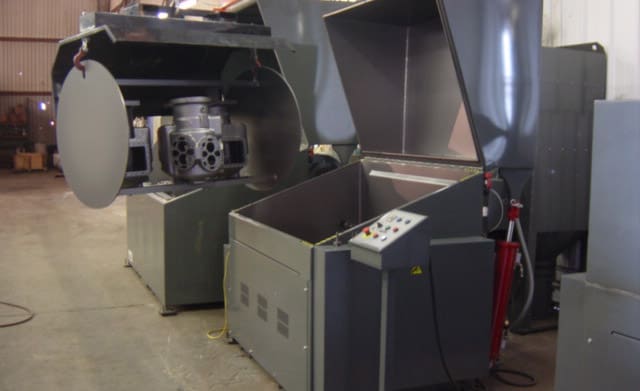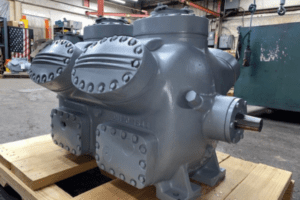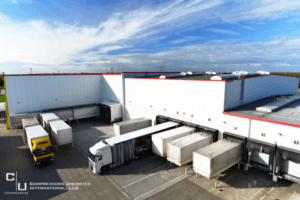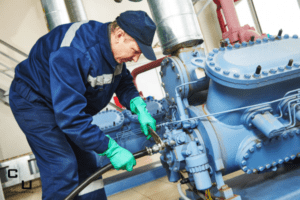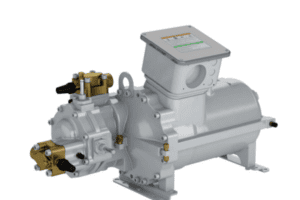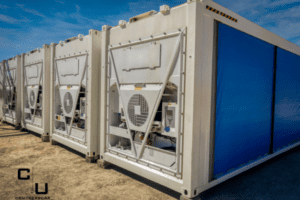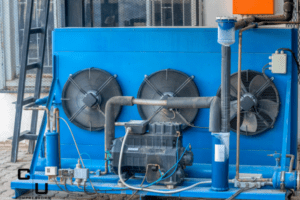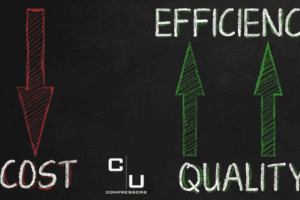When it’s time to purchase a replacement commercial compressor, you’ll usually need one exactly like the one that’s left service – down to the brand and model. That can be a challenge, as OEM-affiliated wholesalers may take months to provide a 100% new compressor.
Often, time is of the essence when a compressor fails … or even just shows signs of problems.
In general, you can expect 7-10 years of reliable service from a new compressor, whether you buy from the OEM or choose a reliable remanufacturing firm. But problems in the operating environment can cause issues, like flooding and slugging, that stop compressors before their time.
Good maintenance practices extend a compressor’s service life, but there is a limit.
In most commercial enterprises, especially those open to the public, your reputation relies on an effective compressor. The compressor does the majority of the mechanical work to make the refrigerant gas available to the rest of the system. When it stops, so does everything else.
Losing compressor function means your HVAC can’t cool or heat the air – both settings rely on the same fundamental processes that affect the refrigerant. From there, it’s only a matter of time before the environment becomes too stifling for productivity and won’t attract much foot traffic, either.
At industrial concerns, this effect can be even more pronounced. Many industrial companies need to hold the work environment at a certain temperature no matter what the outside climate is like. Without the HVAC system running strong, you’re at the mercy of whatever weather conditions might strike, including the affects of humidity.
What’s the solution? A remanufactured commercial compressor.
Benefits of Using Remanufactured Compressors from a Quality Remanufacturing Firm
The remanufacturing process shouldn’t be mistaken for “refurbishing” or “rebuilding” a compressor.
The problem with those two very common terms is that there’s no real definition for either one of them. In some cases, companies will claim that they’ve rebuilt a compressor when all they’ve done is clean up the exterior. No work is done on the inside, leaving any faulty components in place.
Luckily, it’s easy to spot the risk if a company doesn’t offer a warranty and stand behind its work!
On the other hand, a true remanufactured compressor goes through a thorough, proven process. Here at Compressors Unlimited, that includes more than a dozen steps. Each one is carried out by a qualified compressor technician who has the skills and the experience to get the job done right.
All in all, it means re-engineering the product to the standards of the Original Equipment Manufacturer using a combination of requalified, repaired, and new parts and components. At the same time, any parts that are old, faulty, or obsolete need to be replaced, updating the compressor’s specifications.
By replacing such parts, you end up with a unit that offers comparable performance and longevity to the high-priced OEM unit that may take months to ship from a wholesaler. Our goal is to provide you with the same 7-10 year service lifespan that you would get if you chose to purchase an OEM compressor – at a fraction of the cost.
Understanding the Signs of Commercial HVAC Compressor Failure
Early detection of HVAC compressor issues is key to minimizing downtime and costs. Here are some telltale signs that your client’s HVAC system might need a commercial compressor replacement:
- Reduced Cooling Capacity: One of the most obvious signs is a noticeable decrease in the system’s ability to cool the space. This can manifest as occupants experiencing discomfort due to warmer temperatures. Other signs involve products being housed in the area, i.e., a climate controlled environment is having trouble maintaining the levels of humidity that can grossly affect the products being housed.
- Unusual System Noises: Listen for any abnormal sounds, such as grinding, clicking, or rattling, emanating from the compressor. These noises could indicate internal component wear or malfunction.
- Frequent Tripping of Circuit Breakers: If the compressor is struggling to operate, it can cause the HVAC System’s electrical circuit to overload, causing the breaker to trip repeatedly.
- High Discharge Line Temperature: Feeling an unusually hot discharge line coming from the compressor can be a sign of overheating and potential internal damage.
- Increased Energy Consumption: A failing compressor may work harder to achieve the desired cooling capacity, leading to a spike in energy bills.
- System Lockout: Modern HVAC systems may lock out and shut down entirely if the compressor experiences a critical failure.
Choosing the Right Replacement Compressor For Your Commercial HVAC System
Selecting the appropriate replacement compressor for a commercial or industrial system is crucial for optimal performance and longevity. Here are some key factors to consider:
- System Capacity: Ensure the chosen compressor has the correct capacity (measured in tons) to match the existing system’s cooling requirements.
- Refrigerant Type: The replacement compressor must be compatible with the refrigerant used in the existing system (e.g., R-22, R-410A). Mixing refrigerants can lead to system inefficiencies and possible damage.
- Physical Size and Electrical Requirements: Verify that the replacement compressor has the appropriate physical dimensions to fit within the existing equipment space and ensure its electrical specifications align with the available power supply.
- Efficiency Rating: Consider energy-efficient compressor options that can offer long-term cost savings for your client through reduced electricity consumption.
- Manufacturer Compatibility: While various brands are available, sometimes sticking with the original brand might be preferable for guaranteed compatibility and performance. Using the same make and model is recommended by manufacturers and technicians alike.
- Remanufactured vs. 100% New Compressors: Remanufactured compressors offer a cost-effective option with high-quality replaced components. Ensure the remanufacturer provides a warranty for the quality of the compressor. New compressors come with a warranty, higher price and the wait for your replacement might be longer than you’d prefer.
Planning and Executing the Replacement Process of your Commercial HVAC Compressor
Replacing a commercial or industrial HVAC compressor requires meticulous planning and execution. Here’s a step-by-step breakdown:
- Pre-Replacement Assessment: Thoroughly inspect the entire HVAC system to identify the root cause of the compressor failure. This could involve checking for refrigerant leaks, oil contamination, or clogged components.
- System Evacuation and Recovery: Recover the existing refrigerant according to EPA regulations and industry best practices.
- Compressor Removal: Safely remove the faulty commercial HVAC compressor, following manufacturer-specific instructions to minimize the risk of refrigerant leaks or damage to surrounding components.
- System Cleaning and Repair: Clean the remaining system components to remove any debris or contaminants that might contribute to future issues. Repair or replace any additional malfunctioning components identified during the pre-replacement assessment.
- Compressor Installation: Carefully install the new compressor according to the manufacturer’s guidelines. This might involve tasks like brazing refrigerant lines, installing lubricating oil, and verifying electrical connections.
- System Recharge and Leak Detection: Once the new compressor is installed, recharge the system with the appropriate refrigerant amount. Conduct a thorough leak detection test using a reliable electronic leak detector.
- System Startup and Performance Verification: Properly start up the system and rigorously test its functionality. Ensure the desired cooling capacity is achieved, and all components are operating within acceptable parameters.
- Ship Your Compressor to Remanufacturer: Ship the faulty compressor to the remanufacturer as the remanufacturer uses the core for future remanufactured compressors and they will apply a credit towards your purchase. It is best to check with your representative on proper proceedings.
Safety Considerations During HVAC Compressor Replacement
Safety is paramount during any commercial or industrial HVAC project. Here are essential safety precautions to prioritize:
- Wear Personal Protective Equipment (PPE): Always utilize appropriate PPE, including safety glasses, gloves, respiratory protection, and hearing protection, when working on commercial or industrial HVAC systems.
- Handle Refrigerant Safely: Refrigerant can be hazardous if not handled properly. Follow EPA regulations for refrigerant handling, recovery, and disposal.
- Work with Trained Personnel: Complex commercial and industrial HVAC systems should be serviced by a trained and certified technician.
HVAC Compressor Replacement Products from a Source You Can Count On
Our HVAC compressor replacement products undergo a series of functional and environmental tests. At each stage, we are able to recognize and resolve issues before they can affect the system. We deliver a quality end product that handles your application flawlessly.
You can read about our remanufacturing process here. No matter what remanufacturing partner you choose, be sure they are straightforward about the work they do and offer you a warranty you can trust.
*This blog has been updated from its original posting.

